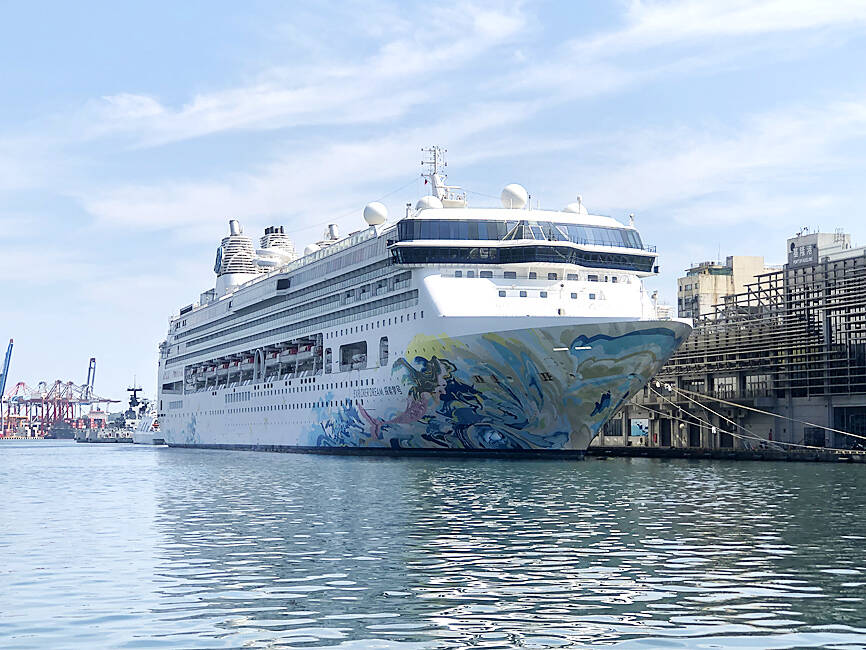Taiwan has further eased COVID-19 protocols for international cruises in an attempt to boost tourism, the Maritime and Port Bureau announced yesterday.
Effective immediately, Taiwan no longer requires inbound passengers to present a negative rapid COVID-19 test taken on the day of arrival in Taiwan or the previous day, the bureau said in a statement.
Instead, passengers only need to conduct a test if they have symptoms, the bureau said, adding that they must quarantine onboard if the result is positive.

Photo: CNA
Outbound passengers undergoing self-initiated prevention, such as those who entered Taiwan within seven days of boarding the cruise liner, still need to present a negative rapid COVID-19 test taken within 48 hours of boarding, it said.
However, they do not need to take further rapid tests onboard as was previously required, the bureau said, adding that those tests are only required if passengers show symptoms.
Crew members working on cruise ships based in Taiwan who are undergoing self-initiated prevention are allowed to board if they present a negative rapid COVID-19 test, it said.
Taiwan lifted a ban on international cruises in October last year.
The bureau said at the time that Taiwan was looking forward to swiftly resuming international cruise services to help the industry resume the growth it was aiming for before the COVID-19 pandemic.
The ban was introduced on Feb. 6, 2020, after a Taiwanese woman traveling on the Diamond Princess cruise liner was confirmed to be one of 10 passengers infected with COVID-19 — the second wave of infections on the ship — when it arrived in Japan after a round-trip cruise that included a 10-hour stop in the Port of Keelung on Jan. 31.

CARROT AND STICK: While unrelenting in its military threats, China attracted nearly 40,000 Taiwanese to over 400 business events last year Nearly 40,000 Taiwanese last year joined industry events in China, such as conferences and trade fairs, supported by the Chinese government, a study showed yesterday, as Beijing ramps up a charm offensive toward Taipei alongside military pressure. China has long taken a carrot-and-stick approach to Taiwan, threatening it with the prospect of military action while reaching out to those it believes are amenable to Beijing’s point of view. Taiwanese security officials are wary of what they see as Beijing’s influence campaigns to sway public opinion after Taipei and Beijing gradually resumed travel links halted by the COVID-19 pandemic, but the scale of

TRADE: A mandatory declaration of origin for manufactured goods bound for the US is to take effect on May 7 to block China from exploiting Taiwan’s trade channels All products manufactured in Taiwan and exported to the US must include a signed declaration of origin starting on May 7, the Bureau of Foreign Trade announced yesterday. US President Donald Trump on April 2 imposed a 32 percent tariff on imports from Taiwan, but one week later announced a 90-day pause on its implementation. However, a universal 10 percent tariff was immediately applied to most imports from around the world. On April 12, the Trump administration further exempted computers, smartphones and semiconductors from the new tariffs. In response, President William Lai’s (賴清德) administration has introduced a series of countermeasures to support affected

Pope Francis is be laid to rest on Saturday after lying in state for three days in St Peter’s Basilica, where the faithful are expected to flock to pay their respects to history’s first Latin American pontiff. The cardinals met yesterday in the Vatican’s synod hall to chart the next steps before a conclave begins to choose Francis’ successor, as condolences poured in from around the world. According to current norms, the conclave must begin between May 5 and 10. The cardinals set the funeral for Saturday at 10am in St Peter’s Square, to be celebrated by the dean of the College

CROSS-STRAIT: The vast majority of Taiwanese support maintaining the ‘status quo,’ while concern is rising about Beijing’s influence operations More than eight out of 10 Taiwanese reject Beijing’s “one country, two systems” framework for cross-strait relations, according to a survey released by the Mainland Affairs Council (MAC) on Thursday. The MAC’s latest quarterly survey found that 84.4 percent of respondents opposed Beijing’s “one country, two systems” formula for handling cross-strait relations — a figure consistent with past polling. Over the past three years, opposition to the framework has remained high, ranging from a low of 83.6 percent in April 2023 to a peak of 89.6 percent in April last year. In the most recent poll, 82.5 percent also rejected China’s